Home » Spotlight • US business news » Six Company Feuds That Saw One Put Out Of Business
Six Company Feuds That Saw One Put Out Of Business
https://www.whatjobs.com/news/usa/us-business-news/six-company-feuds-that-saw-one-put-out-of-business

By Hugh Fort in Spotlight, posted February 22, 2024

The world of business has seen some brutal feuds between giant companies.
Coca-Cola vs Pepsi and Microsoft vs Apple are two examples of companies going head-to-head and keeping each other on their toes for continual improvement.
Others lead to one company putting the other out of business, and, in some cases, taking control of their rival.
Here are six business rivalries that led to one company going out of business.
Blockbuster vs. Netflix
Blockbuster was the leader in video rentals in the 1990s, followed by DVD rentals in the 2000s.
Netflix was actually founded by boss Reed Hastings because he was so annoyed at Blockbuster's fines for late returns.
Netflix was initially a DVD mailing service.
The two companies went head-to-head, and at one point it was touch-and-go over who would win.
However, Netflix's decision to start streaming online put the company in pole position.
Blockbuster was slow to move with the times, and even rejected a $50 million buyout proposal from Netflix.
It eventually filed for bankruptcy in 2010.
The full story can be found here.
Nokia vs. Apple
Before the invention of smart phones, Nokia was the giant in terms of producing mobile phones.
People in their 30s and 40s may remember playing the iconic game "Snake" and battling with the early versions of predictive text on their clunky mobiles with tiny screens.
However, in 2007, Apple came along and revolutionized the industry with its iPhone.
Users now had touchscreen technology and a range of apps to download.
The move left Nokia unable to compete and its mobile phone business was sold to Microsoft in 2014.
Need Career Advice? Get employment skills advice at all levels of your career
Borders vs. Amazon
Borders was a giant in book retail in the U.S. in the 1990s.
However, a man called Jeff Bezos set up what was then a small online bookstore called Amazon.
Amazon's competitive pricing and convenient shipping options led to a rapid expansion.
The invention of e-books and Kindle had a big impact on the financial issues Borders was already facing.
It filed for bankruptcy in 2011 and was eventually liquidated.
Kodak vs. Digital Photography
This isn't a company vs company feud, but more the failure of a company to realise times were changing.
Kodak was always a leader in film photography.
However, when digital photography was invented, the company was unable to adapt quickly enough.
There is something of an irony about this, as Kodak's engineers actually invented an early form of digital photography in the 1970s.
No-one in the company was interested in the, admittedly primative, technology.
Kodak filed for bankruptcy in 2012.
MySpace vs. Facebook
MySpace was an innovative social networking site in the early 2000s.
Users were able to connect with other like-minded folk.
Then along came Mark Zuckerberg and Facebook.
The new social media was doing the same as MySpace but better.
It had a cleaner interface, better privacy controls and it focused on real-life connections.
MySpace didn't adapt to what was on offer from its rival and fell into obscurity.
WWF vs. WCW
Pro-wrestling is a crazy world, but it's big money.
The industry known as "sports entertainment" was at its peak in the mid-to-late 1990s.
The two main companies were the World Wrestling Federation (WWF) and World Championship Wrestling (WCW).
The two companies went head-to-head on Monday nights, known as the "Monday Night Wars."
WCW led the ratings war for many months.
However, the legendary Stone Cold Steve Austin and his "feud" with real-life owner Vince McMahon, turned the tables.
WCW started to collapse in 2000.
McMahon swooped in in 2001 to take control of the company.
WWF, now known as WWE, made profits of $1.3 billion in 2023.
Follow us on X, LinkedIn, and Facebook













